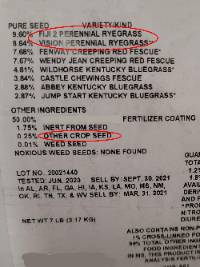Purchase Quality Grass Seed
Fall planting of cool season grasses, wit h bluegrass and tall fescue, is at hand. Overseeding requires many steps but one of the most important is choosing a quality seed.
h bluegrass and tall fescue, is at hand. Overseeding requires many steps but one of the most important is choosing a quality seed.
All grass seed is not the same. If you don't know what to look for, you may be introducing unwanted intruders into your lawn. You should be concerned with seed contaminated with orchardgrass and/or rough bluegrass (Latin name, Poa trivialis, or Poa triv for short). Both are perennial grassy weeds that cannot be selectively controlled once they are established in a lawn.
Orchardgrass is a problem because it grows faster than fescue and bluegrass, is lighter green, and unsightly. Rough bluegrass is fine-textured and forms circular patches. It blends in until summertime heat causes it to rapidly turn brown. If the rough bluegrass would die in the heat, it would only be a temporary problem. Unfortunately, it only goes dormant, and turns green again with cooler temperatures and rain.
Buying quality seed starts by deciphering the seed label. One of the most important things to look for is listed as "% other crop". "Other crop" refers to any species that is intentionally grown for some purpose. That would include turfgrasses other than the one you are buying. Orchardgrass and rough bluegrass both are listed as “other crop” seed.
Seed labels are required by law to show the percentage (by weight) of "other crop" in the bag. Unless a species constitutes 5% or more, the label doesn't have to list the species. How much "other crop" is too much? It depends on what the "other crop" is, and your expectations. "Other crop" may refer to something relatively harmless, like a small amount of perennial ryegrass in a bag of tall fescue. Or it may refer to something bad, like rough bluegrass or orchardgrass.
A homeowner has no easy way of knowing what the "other crop" is. If it is something bad, less than one-half of 1% can ruin a bag of seed. For example, if a bag of tall fescue seed contained 0.5% orchardgrass, the buyer would end up "planting" 12 to 16 orchardgrass seeds per square foot! Similarly, planting Kentucky bluegrass seed containing 0.5% rough bluegrass would result in about 25 to 35 rough bluegrass seeds per square foot of lawn. If your quality expectations are high, you want the "other crop" to be as close to zero as possible. Good quality seed often has 0.01% “other crop” or less.
Check the label carefully for inexpensive mixes laced with other turf species. Many times, bluegrass or tall fescue will have perennial rye in the bag. Rye germinates quickly but dies out under harsh summers. If you are buying bluegrass, buy all bluegrass; there is no need for filler seeds. Same is true for tall fescue, buy tall fescue seed only, not rye grass or some other fluff.
When it comes to grass seed you get what you pay for, so buyer beware. Read the label and always purchase from a reputable garden center. One last tip, avoid most bagged seed mixes sold for a regional or national market, as often they don’t withstand our Kansas City climate.
Other Resources
Have questions? The Garden Hotline is staffed by trained EMG volunteers and Extension staff who will assist you with questions.
Phone: (913) 715-7050
Email: garden.help@jocogov.org